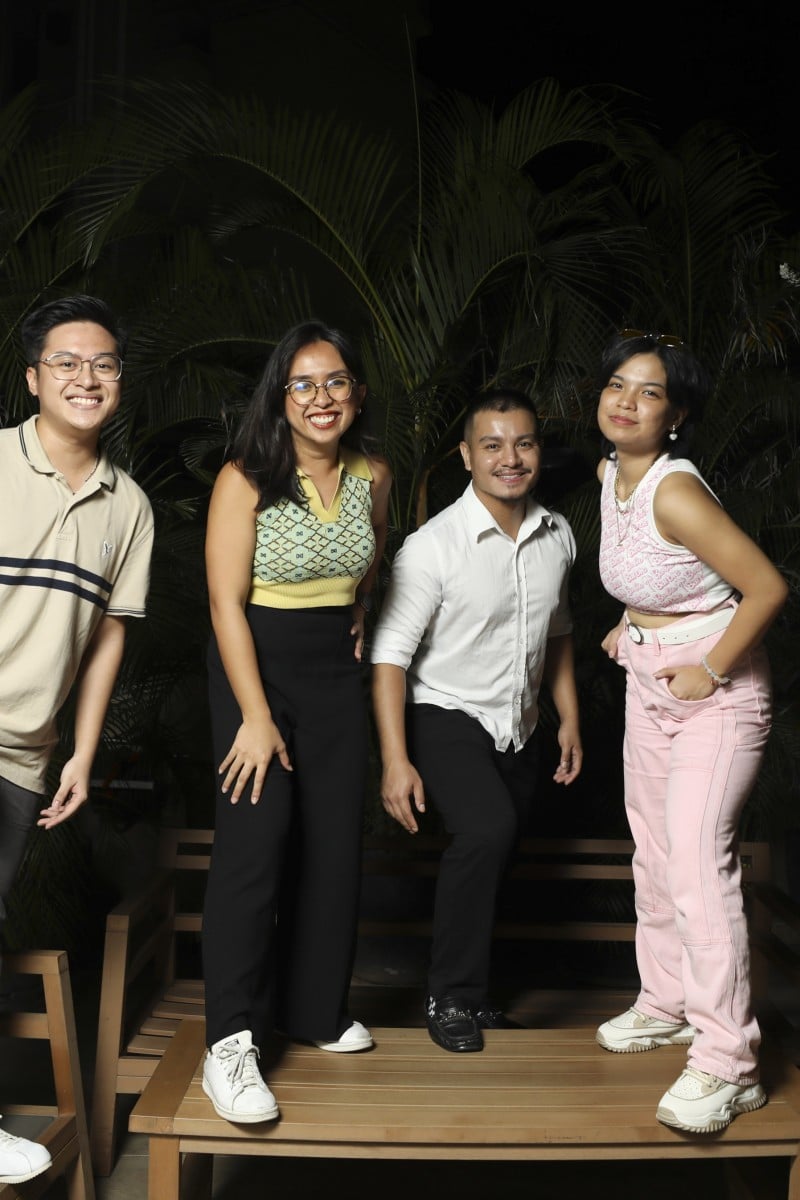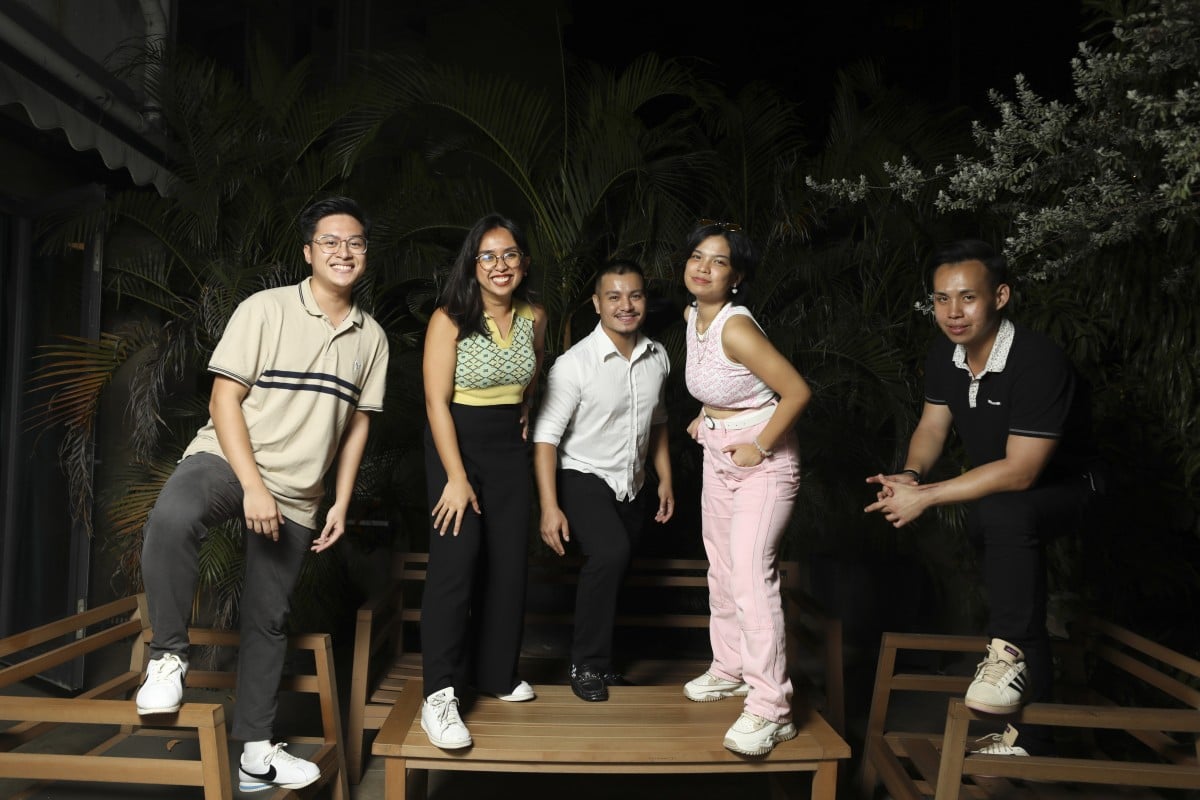
- This year, the support group has organised workshops and a retreat to talk about mental well-being and healthy relationships in the Filipino community
- Every week, Talking Points gives you a worksheet to practise your reading comprehension with exercises about the story we’ve written
 Section Juan members Danniel Jeremy Agot Estabillo (from left), Christine Neil Tejedor Vicera, Ray Yumul, Alexandra Anselmo Sotto, and Stephen Chan. Photo: Xiaomei Chen
Section Juan members Danniel Jeremy Agot Estabillo (from left), Christine Neil Tejedor Vicera, Ray Yumul, Alexandra Anselmo Sotto, and Stephen Chan. Photo: Xiaomei ChenAlexandra Anselmo Sotto was going through a tough break-up when she stumbled upon a summer retreat organised by Section Juan, a support group for Filipino-Hongkongers.
Held in Cheung Chau in early September, the retreat’s workshops for Hong Kong’s Filipino youth focused on mental well-being, healthy relationships, and embracing cultural identity.
During the two-day event, Sotto, a university student, found solace in the 20 other participants.
“It was such a nice environment to talk about mental health struggles. I don’t need to explain so much any more because they understand the context [I’m in] ... the Filipino culture,” said the 21-year-old, who came to Hong Kong at the age of 15. “In that space, I felt like I was truly not alone in this struggle, and I can share with people that ‘I get you’.”
‘I’m so tired of it’: Filipino Hongkongers discuss racism in media
Filipinos represent the largest ethnic minority group in the city, making up 31.5 per cent of the non-Chinese population, with a total of about 184,000 people. However, before the establishment of Section Juan in 2013, there was a lack of organisations catering to the specific needs of Filipino-Hongkonger youth.
The leaders of this pioneer support group are professionals from various fields, who organise activities to promote the cultural and social development of the city’s young Filipinos.
“Anything you don’t learn in [Hong Kong] school, you can enrich yourself through Section Juan,” said Ray Yumul, 31, an officer of the group, who explained that its name was meant to create a safe educational space for Filipino youth while nodding playfully to “Juan”, a common name in their culture.
He explained the group’s goal of reaching out to more Filipino students with this message: “We have a group here of people who are like you – especially for those Filipinos or students who just moved to Hong Kong and [are] looking for a community.”
Links between mental well-being and culture
While the summer retreat was Section Juan’s first, it was the culmination of a series of workshops this year that explored the connection between mental health and culture through Filipino literature and cinema.
“This [retreat] was a place for them to have some space away from their usual communities and to reflect on their mental health, learn about Filipino culture and values,” Yumul explained.
Christine Neil Tejedor Vicera, a 26-year-old officer of the group, highlighted a few core issues affecting the Filipino community and how these were addressed at the retreat.
“Something that we value a lot is community – our social harmony. So because of that, it’s easy for us to be people pleasers, or if something is bothering us, we would rather keep it to ourselves, or bottle it up, because we value social harmony,” she noted.
Why your mental health will thank you for saying ‘no’ to people-pleasing
Another ideal they talked about was “utang na loob”, which is Tagalog – one of the main languages from the Philippines – for a sense of obligation to repay a favour.
Vicera noted that if not managed properly, those values could lead to unhealthy habits in relationships: “The important things are setting boundaries and being open to seeking help ... I feel like it’s still a stigma.”
To encourage people to reach out for support, one of the retreat’s workshops was an “empathy cafe”, where participants shared their stories and practised actively listening to one another to foster compassion.
“It’s soft skills development – learning how to be an active listener,” Yumul explained. “We share our stories, anything that we’re going through, and then everyone will be expressing.”
‘You can be both at the same time’
Last June, the group published a video project titled “I am ...” – which has more than 6,000 views on YouTube. In the video, Filipino-Hongkongers share their stories of growing up in the city and how their identities go beyond common stereotypes and assumptions.
Section Juan gives them a safe space to explore every aspect of their cultural identities.
Danniel Jeremy Agot Estabillo, an officer of the group, reflected on how growing up in the city affected his perception of himself.
“At school, you’re speaking in Cantonese, and at home, you’re speaking Tagalog or a Filipino language. And sometimes you’re just in a certain conflict: who am I in the city?” the 23-year-old said, noting that he ended up finding his place with help from people around him.
Another officer, Stephen Chan II, emphasised the importance of being both Filipino and a Hongkonger: “You don’t have to choose – you can be both at the same time ... Try to take all the good things between both sides and make yourself from those things.”
Embracing this experience is how Section Juan builds connections with other groups, Vicera added.
“This group is open to anyone who wants to learn about Filipino culture,” she said. “Things we share [are] quite universal to Asian culture, and many non-Filipinos that have participated in our projects ... can relate.”
To test your understanding of this story, download our printable worksheet or answer the questions in the quiz below.
